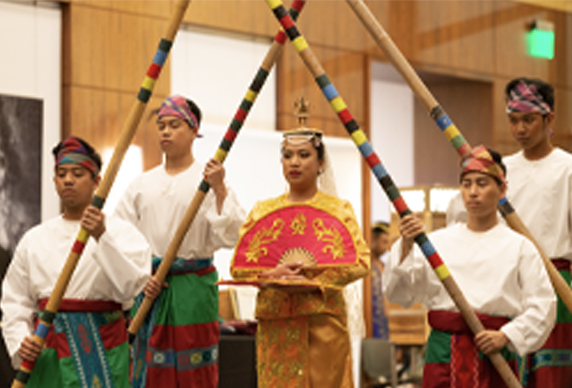Impact Report: Year-Ends 2021 and 2022
 Kababayan Learning Community at Skyline College: the Pilipino and Pilipino-American
cultural experience
Kababayan Learning Community at Skyline College: the Pilipino and Pilipino-American
cultural experience
The Pilipino community has a long history in the United States and in San Mateo County. As a result of its victory in the Spanish-American War, the United States gained the archipelago as a territory and Pilipinos came to the U.S. in several waves.
In the early 20th Century, Congress established a scholarship program through the Pensionado Act (Act 854 of the Philippine Commission) for a total of about 500 Pilipinos over 40 years to attend school in the U.S. During this same period, until 1946, over 100,000 Pilipinos were recruited as contract workers in the Hawaiian sugarcane fields. The manong generation of Pilipinos, which arrived in the 1920s and 30s to work in the fields throughout the entire West Coast, traveling with the seasons, was the largest of these immigration waves, with thousands arriving each year until 1965.
When College of San Mateo (then San Mateo Junior College) opened in 1922, several students from the Philippines were among the first to enroll. According to an article in the Daily Journal, “by 1928, there were enough [ students] to organize a Filipino [sic] Club which appeared in most of the college’s yearbooks from 1929 to 1937. Filipino [sic] students made the honor society, joined the Engineers’ Club, the yearbook staff, the Art Club and took part in intramural sports and varsity athletics.”
Today, more than 80,000 Americans of Pilipino descent live in San Mateo County and almost 10% of our community college district’s students identify as Pilipino. Almost 20% of the students at Skyline College are Pilipino. For a long time, it was a student population that was underserved. Luckily for the District, Liza Erpelo joined the Skyline College teaching faculty 20 years ago.
“I was hired to teach English and my dean, Anita Martinez, asked me to restart the Kababayan Program. The original funding came from the President’s Innovation Fund at Skyline College and we started off with one developmental English class every day.” Eventually, Liza created a curriculum, recruited students (which wasn’t hard!), and set out to get more teachers. “Slowly we added classes on the history of the Philippines, literature, and sociology on Pilipino community issues, music, dance, and more.”
The Kababayan Learning Community is now a learning community (since 2013) with a variety
of rich and engaging programming that celebrates Pilipino history, heritage, and culture
and also supports students of Pilipino descent. The Pilipino Cultural Night is an annual premier event for this learning community. Students write, direct, and
perform in a play that is presented in two performances. The activities are integrated
into English classes, combining academics with art in a celebration of culture. Proceeds
from ticket sales benefit the Friends of Kababayan Scholarship Fund housed at the
Foundation. 
Liza Erpelo still coordinates the learning community, teaching the English and literature courses, and working with a counselor, a history/ethnic studies professor, and a Tagalog instructor within Kababayan. She teaches outside the community as well and is pursing her certificate in teaching ethnic studies. “The pandemic was a struggle for us,” says Liza. “Part of the culture is getting together to eat, but we couldn’t do that for a long time. We’re rebuilding and getting students excited to be back. In the near future, I would like to do some in-person team-building activities.”
When it comes to the future of the Kababayan Learning Community, Liza would like to expand the program in the District and statewide. “I’ve worked with Doris Garcia to help with the creation of Katipunan, College of San Mateo’s Pilipino Learning Community and we’re working with Cañada College to start programming there as well. There are only six Pilipino Learning Communities statewide and I want to connect them all and expand to more community colleges.”
San Mateo County Community Colleges Foundation is a proud partner of Kababayan. The Learning Community has two funds, PIF-Kababayan Program Fund and Friends of Kababayan Fund, and collaborates with the Foundation on ticket sales for the annual Pilipino Cultural Night. Many of the students are first-generation or immigrants and are in need of the financial resources they receive from a variety of scholarships. “Our challenge is to see that more students continue despite the financial hardships they face. Many of our students will send family members to study at Skyline College and be a part of the learning community, and many give back once they’ve completed their education. We are grateful to all of our supporters and donors who are continuing the legacy of the Kababayan Learning Community.”
Read more Impact Report articles.
Download a pdf version of the Impact Report.